Our prices are affordable with no hidden fees.
Our team members are all friendly.
No hassle, no guesswork, simple easy contracts.
Join our long list of satisfied customers.
We always deliver and pick up the container on time.
Having your own compost is an excellent way to improve your soil quality while also reducing the amount of waste that enters our landfills.
Green waste disposal in Savannah can be rather simple when you follow these steps to building your own compost bin to hold leaves, grass clippings and certain food wastes in.
Building the Bin
A compost bin can be made from four standard-sized pallets that are 48” on all sides.
Simply use these pallets to create a box shape, with one pallet forming each one of the sides. Tie planks together with bailing wire in order to hold them together, and then go back and add three or four two-inch long wood screws along each side for additional reinforcement.
Place the bin in an area that receives around four to six hours of sunlight each day. It should also be some distance from your house so that you won’t be bothered by the smell of rotting matter.
Adding Material
Begin by adding a combination of brown and green material to the bin.
Brown matter can consist of leaves, pine needles and corn stalks, while green material could be clippings from grass or bushes. Add some organic matter such as eggshells, orange rinds or potato peelings, but avoid adding meat or dairy products.
Turn with a pitchfork until it is evenly mixed, and then allow it to cure.

Maintaining your Compost
Add new material to your compost bin as you acquire it. Some good things to include are vegetable peelings, newspaper, cardboard or grass clippings.
You may want to shred paper or cardboard so that it can be mixed more evenly, and this also allows it to break down quicker.At least once a week, check the matter inside your compost bin to see if it feels dry to the touch.
If so, add a little bit of water before turning it thoroughly with a pitchfork. You may need to add water two to three times a week whenever conditions are especially dry or humid.You can begin enjoying compost from your bin in as little as eight weeks.
After that time, any remaining chunks of material that have not yet decomposed can be sifted and placed back into the compost bin along with fresh material in order to keep the cycle going.
Composting organic waste is just one way to make an environmental difference for generations to come. For more information on recycling or waste disposal, contact us.
One of the best ways to get on the recycling bandwagon is to set up your own compost pile. It’s easy to do, and not only provides food waste solutions, it treats your garden and flower beds to rich and invigorating compost to help them grow better.
There is a lot of information available about composting, it’s not complicated, but doing a little research will make building your compost pile easier and more likely to quickly produce dark, rich compost for your garden.
There are 4 things your compost pile needs:
• Carbon – for energy, usually found in items that are brown and dry.
• Nitrogen – to produce oxidizing organisms, usually green and wet.
• Oxygen – to oxidize the carbon
• Water – in the right amounts to aid the process.
Your house and yard are full of items that can be composted and kept out of landfills.
All the items need to be small in size so they more easily decompose. Fall leaves need to be chopped as they are picked up by a lawnmower. Grass clippings also make good compost in scattered quantities.
Food waste such as eggshells, potato peels, apple cores, coffee grounds and filters, or teabags and other table scraps make great compost. But don’t add such items as bones, meat or fish.
You can start a compost pile by simply piling the items on the bare earth or you can buy or make compost bins or tumblers that make the process a little neater. Start by layering grass clippings and food waste.
Then add some water only when the pile seems dry. Cover the pile if it rains too frequently. Too much moisture will inhibit the process. The internal heat that builds up in the pile will help create the compost and kill any weed seeds that might be there.
Every couple of weeks, turn the items over with a pitch fork to mix in newer items and to add oxygen. Regularly turning and adding new items or a little bit of garden soil helps speed up the production.
It can take anywhere from a month to a year to produce compost, depending on a myriad of factors, including moisture, internal heat, weather, and items being recycled.
It’s estimated that about 1/3 of the items in a landfill could be composted. Building your own compost pile and recycling those food scraps and grass clippings can go a long way to reduce your impact on the earth.
Because we support recycling in our communities, contact us for your residential or commercial waste hauling needs and we’ll all go green together.

Activate your compost
‘Activators’ can be added to your compost to help kick-start the process and speed up composting. Common compost activator materials are: comfrey leaves, grass clippings, young weeds, well-rotted chicken manure.
Flying insects attracted to your compost?
Fruit flies are naturally attracted to the compost pile. They can be kept at bay by simply covering any exposed fruit or vegetable matter.
Keep a small pile of grass clippings next to your compost bin, and when you add new kitchen waste to the pile, cover it with one or two inches of clippings. Adding lime or calcium will also discourage flies.
Unpleasant smell coming from your compost pile?
This can be a concern in urban and suburban areas with small lots and neighbors living close by. Odors can be reduced, or eliminated, by doing two things: first, DO NOT put bones or meat scraps into the compost; second, cover new additions to the compost pile with dry grass clippings or similar mulch.
Adding lime or calcium will also neutralize odors. If the compost smells like ammonia, add carbon-rich elements such as straw, peat moss or dried leaves.
Is your compost pile steaming?
This is not aproblem. A hot, steamy pile means that you have a large community of microscopic critters working away at making compost.
Is your compost pile soggy?
This is a common problem especially in winter when carbon-based materials are in short supply. You can restore your compost to a healthy nitrogen-carbon balance.
Matted leaves, grass clippings clumping together?
This is a common problem with materials thrown into the composter. The wet materials stick together and slow the aeration process.
There are two simple solutions: either set these materials to the side of the composter and add them gradually with other ingredients, or break them apart with a pitchfork. Grass clippings and leaves should be mixed with rest of the composting materials for best results.
Problems with raccoons?
If there’s a population of raccoons in your area, they will be naturally attracted to your compost pile. The best solution to this problem is to bar their entry to the compost. (Traps and poisons are more trouble than they’re worth.)
A wood or metal lid can be easily hinged to the bin described above on this page, or you can buy a commercially-made compost bin with secure fitted lids which are pest-proof.
A moveable feast.
The soil beneath a compost bin becomes enriched as nutrients filter down with successive waterings. You can place your bin on a plot of earth which you plan to use for a future vegetable or flower bed, or fruit tree.
Each year, you can move the bin to a different area; you’ll get a double benefit – the compost from the bin, and a bed of nutrient-rich soil ready for new plantings.
Additive only
Compost should be used as a soil additive, and not exclusively as the growing medium. Compost is a source of rich organic matter which provides nutrients for growing plants, but should be thought of as one component of a healthy garden bed.
Savannah Dumpster Rentals EZ provides an indispensable solution to organic waste management. Our commitment to eco-friendly practices and efficient dumpster services addresses the pressing need for responsible waste disposal in Savannah.
Our prices are affordable with no hidden fees.
Our team members are all friendly.
No hassle, no guesswork, simple easy contracts.
Join our long list of satisfied customers.
We always deliver and pick up the container on time.
